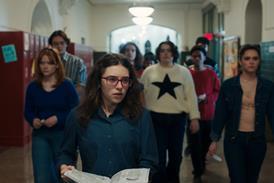Frank Boyd of the Creative Industries Knowledge Transfer Network talks to Screen about the future of convergent media.
Frank Boyd has worked at the forefront of digital media since the early 1990s. He is currently the director of CI KTN, the Creative Industries Knowledge Transfer Network.
The CI KTN supports UK creative industries, particularly in the area of emerging technologies. This month, CI KTN began collaboration with UK government funding agency Technology Strategy Board in a programme to develop convergent media and crossplatform innovation in the UK.
The TSB is offering £1.8 million to developers in a series of competitions and feasibility projects.
Frank Boyd talked with ScreenTech about his experience in digital entertainment and his shared his thoughts on where the field has been and where it’s going.
So what do you personally call this field? Cross-platform media? Transmedia? Convergent media?
I’d avoided using the word “transmedia” for quite a long time, because I thought it was just another neologism. Last year at MIPTV, a friend of mine Matt Costello - who wrote The Seventh Guest, one of the first interactive video horror stories – was giving a talk and was asked the same thing. He said, “Well, when I first started working on this stuff it didn’t even have a name. Then it was called multi-media, then it was called interactive media, then it was called new media, then it was called digital media, and now we’re calling it transmedia.”
I think one of the reasons we’ll stick with “transmedia” now is because “Transmedia Producer” has been acknowledged as a credit by the Directors Guild of America. So it clearly will have some currency for a while. But sometimes I call it transmedia, sometimes I call it cross-platform.
Can you talk a bit about your professional background?
I’ve worked in the space that is now called transmedia for nearly 20 years now. And transmedia is just the latest term to describe a set of new ways of telling stories which have been made possible by the advent of digital technology that we’ve seen emerging since the early ’90s.
My first involvement in this running a series of programmes called Innovation Labs, putting together people from different backgrounds in television and what was then CD-ROM design, but then became web design and coding, to try to understand how they could work together, how you marry different forms of linear storytelling with the interactive possibilities of digital media platforms.
Then I got invited to come work internally at the BBC doing a similar thing, trying to get together different parts of the BBC to explore the creative possibilities of red-button, interactive television.
In recent years, before joining the organisation I now run, Creative Industries Knowledge Transfer Network, I’ve been running a series of workshops, labs and events around the world, bringing people together from different sectors for explore the possibilities of creating new experiences and telling new kinds of stories on digital platforms.
What are some of the major issues confronting cross-platform media now?
To be honest, we’re still at a pretty early stage of really understanding how to do it, and for a combination of reasons. I think we still have problems getting people from different professional cultures to work together effectively. And that’s one of the things that CI KTN has been working on. We work with a number of other agencies trying to understand what the important technological developments affecting creative industries are, and trying to identify what the opportunities and challenges are creatively and in terms of business models.
We’re running a programme right now which has three challenge areas in it. One is about the reinvention of local media, the second is around the development of new tools for the early development of cross-platform projects, and the third one, which will be launched later this year is about metric analysis and trying to understand what consumers and users are actually doing and how to monetise their attention.
But we do find that, even in the context of what we do, when we bring, say, our digital people together with our tv people, they have very, very different ways of thinking. They have different approaches to what they do. And it’s still very difficult for us to integrate the clash that happens on these transmedia projects between people with very different skillsets and get them to collaborate.
So that’s one of the issues I think we’re still grappling with. And I think we’re still dealing with problem of inventing new business models. What it tends to be, still, is incumbents – publishers, distributors, broadcasters in the established media industries – perhaps spending more time trying to protect and shore up 20th century business models than really investing in new business models.

























No comments yet